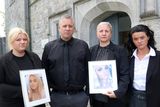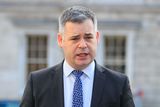Aoife Johnston’s family ‘haunted’ by fact her life could have been saved as inquest hears no mention of dying teen in staff handover notes
Inquest hears Aoife could have been saved had she received antibiotics in timeAssistant Director of Nursing Nicola Quinn fought back tears as she revealed how she exhausted all options for available staffTwo consultants were asked to attend UHL and one refused Inquest hears prescriptions were given by nurses to patients unsigned by doctors, a practice which is ‘commonplace’





An inquest into the death of Aoife Johnston (16) heard how University Hospital Limerick (UHL) emergency department staff were so worried at the threat of the unit being overwhelmed by a flood of seriously ill patients they requested surge measures be triggered.
It also heard how nurses and nurse managers considered whether an emergency department consultant – who refused to attend the hospital - could be compelled to come in, but non had the power to do so.
The death of Aoife - who was almost 12 hours in a UHL A&E storage room while awaiting assessment - is "troubling and haunting" for her devoted family as it emerged her meningitis and sepsis was fully treatable with antibiotics had they only been administered in time.
The revelation came as senior UHL nursing manager Nicola Quinn described as "a miss" the fact that there was no mention of Aoife in the medical handover notes on December 18 2022, over 12 hours after she arrived at UHL, despite the fact she was critically ill.
A junior doctor who fought to save Aoife's life warned that medical staff faced "an impossible situation" in the UHL emergency department because of chronic overcrowding in December 2022.
Aoife died from sepsis after waiting over 12 hours for treatment - despite having arrived at UHL with a letter from a ShannonDoc GP stressing that she required urgent care because of suspected sepsis.
A Limerick Coroner's Court inquest, Coroner John McNamara was told by counsel for the Johnston family, Damien Tansey SC, that microbiology tests subsequently showed that the meningitis which Aoife contracted "was capable of being eradicated by all of the conventional antibiotics."
Aoife Johnston lying on a makeshift bed made up from two chairs in UHL's overcrowded A&E hours before she died
Aoife arrived at UHL at 5.40pm on December 17 - but didn't receive the critical antibiotics until around 7am on December 18, a delay with tragic consequences.
She was not seen by a doctor until after 6am despite pleas from her family.
Mr Tansey warned the inquest that Aoife's family finds it "troubling and haunting" that Aoife could and should have been saved had she received prompt treatment,
It emerged that several nurses and nurse managers had desperately sought clinical support measures given the spiralling pressure on the emergency department over that 48-hour period on December 17/18 2022.
Nurse Katherine Skelly rang two consultants asking them to attend UHL as she escalated the situation.
Clinical Nurse Manager Allison Nolan said they sought urgent measures in a bid to ease pressure on frontline staff.
"(We needed) not just leadership but clinical cover."
Senior staff learned that Emergency Consultant Dr Jim Gray had declined to attend.
Nurses and UHL Executive on Call Fiona Steed considered whether Dr Gray could be compelled to attend UHL - but none had the power to do so.
Mr Tansey queried whether they were aware if the matter of the refusal to attend had been referred to the UHL medical director.
Ms Nolan said she "absolutely" was unhappy as nurses were pleading for clinical support.
"There were patients that needed care. They needed a doctor. Aoife needed a doctor. Of course I was unhappy."
Mr Tansey said that three separate opportunities to intervene to save Aoife were missed.
"She slipped through all the cracks. She was missed all the way along - from handover, registrar meetings and the various reports done."
Assistant Director of Nursing, Nicola Quinn, fought back tears as she said the emergency department was overwhelmed that night by an unprecedented flood of seriously ill Category Two patients.
Ms Quinn said UHL was down 22 nursing staff on December 17 and 17 nursing staff on December 18.
"I exhausted all options for available staff," she said as she confirmed she had desperately contacted nursing agencies and even off-duty UHL staff for cover.
The numbers in the emergency department soared from 101 to 191 patients in just over 24 hours.
"Aoife was never brought to my attention that day (December 17). It wasn't just the emergency department that was busy. The whole hospital was busy. I can't make ten of myself. Do you think I don't regret that day? Of course I do," she said as she fought back tears.
She told the inquest the Category Two patients should have been re-triaged to allow the focus to be placed on the most seriously ill.
"That is where Aoife was let down - there were so many Category Two (patients) coming in in such a short time...it was a conveyor belt. They just kept coming in. That (re-triage) is what should have happened. It was too busy - they did not do it."
"She (Aoife) needed antibiotics (but didn't get them in time)."
Aoife's heartbroken mother Carol has told of the family's horrendous experience
Two doctors confirmed that such was the sheer scale of overcrowding, that doctors would sign prescriptions for medicines to deal with symptomatic issues such as nausea and diarrhoea on the recommendation of a triage nurse and without having actually seen the patient.
The inquest heard that some prescriptions where medicines were given by nurses to patients were unsigned by a doctor.
Senior House Officers Dr Leandri Card and Dr Claire Leatham both warned that it was not in accordance with best practice and not ideal - but was unavoidable given the serious overcrowding situation in UHL's emergency department that staff were battling to cope with.
Both doctors agreed that the situation in the emergency department that weekend was "akin to a warzone”.
Dr Card said the practice was commonplace in the emergency department because of chronic overcrowding. "It happens on every shift, every day," she told the inquest.
Dr Card, who is from South Africa, wiped away tears as she confirmed she no longer works for the HSE and is now employed in a private urgent care centre.
Registrar Dr Manoj Kumar Budhauliya said he treated Aoife when she was taken to the resuscitation room and fought to save her with antibiotics and scans to determine the nature and extent of her infection.
But Mr Tansey warned that, by this stage, it was too late.
"She was beyond recovery or repair by the time of your intervention," Mr Tansey said.
Registrar Dr Muhammed Bilal told the inquest he could not recall any conversation with a triage nurse who had flagged hours earlier that there was a sepsis concern over Aoife.
"There was an exceptionally high volume of patients. There were prolonged waiting times. I spent most of my time in resuscitation. It was a very busy day. I cannot recall. I don't remember them coming to me to tell me about her (Aoife) and asking me to see the patient."
Dr Pandeep Maheshwari said the emergency department was chaotic and like a warzone that weekend.
When he saw Aoife in the resuscitation room she was flailing around and incoherent as the infection spread from her blood to her brain.
Dr Lauren Fernandes, a Senior House Officer, fought back tears as she recalled seeing Aoife's parents beside their critically ill daughter and telling her how much they loved her.
"I felt helpless - knowing there was little I could say to comfort them," she said.
The Johnston family asked for Dr Fernandes to be publicly thanked for how she fought to save Aoife when she came on duty.
"In Aoife's case you did everything conceivably and humanly possible to preserve (her) life," Mr Tansey said.
Today's News in 90 Seconds - April 23rd
Aoife's parents James and Carol fought back tears as they revealed how they repeatedly begged UHL doctors and nurses to help their daughter as her mother Carol warned she watched helplessly as her daughter was dying in front of her eyes.
Aoife's parents, James and Carol, attended the Kimallock inquest alongside her sisters, Meagan and Kate.
Framed photographs of Aoife were placed on the table before the coroner.
"We watched our daughter die," Carol told the hushed Kilmallock courtroom when the inquest opened yesterday.
Aoife, who was from Shannon in Co Clare, died at UHL on December 19 2022 after contracting bacterial meningitis and then sepsis - but had been waiting for over 12 hours for treatment.
The inquest, is expected to conclude on Thursday.
Join the Irish Independent WhatsApp channel
Stay up to date with all the latest news





















